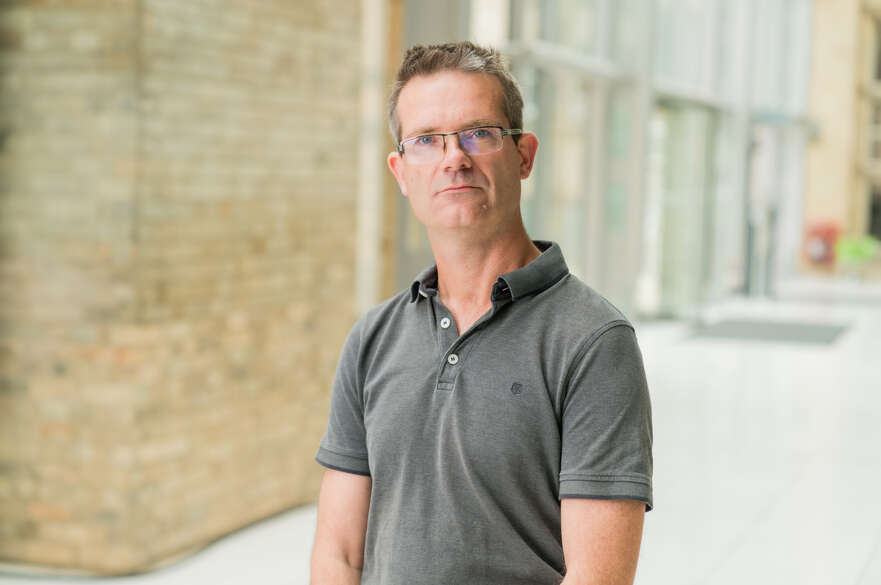Role
Chris Sumner is an Associate Professor of Auditory Neuroscience in the Department of Psychology. He has a background in engineering and has studied various aspects of how we hear.
Career overview
Chris has a PhD in Computer Science from Imperial College London, where he first became interested in how the brain processes sound. He conducted his postdoctoral research in The University of Essex and the University of Michigan. In 2004 he joined the MRC Institute of Hearing Research where he led a program of research into the neural correlates of auditory perception and the underlying computations. He joined NTU in 2019.
Research areas
Chris’ research focuses on understanding the neural computation underlying how we hear. He does this with a variety of methods, but often by building computer models (simulations) of neurons, neural systems, and machine learning models, with the aim of relating processing by single neurons to our perception of sound. He believes that this understanding is critical in order to tackle the problems associated with hearing loss.
Recent research interests include:
- How the neural coding of sound is altered by hearing loss and how this might affect speech recognition in complex environments (e.g. cocktail parties).
- How low-level sensory processing influences the coding and recognition of complex acoustic signals such as (but not limited to) speech.
- The mechanisms underlying resolution of sound frequency in the auditory system, from the cochlea to the cortex, and perception.
- Neural adaptation in the auditory system: mechanisms and perceptual consequences.
- Audiovisual integration of speech.
- Neural processing of acoustic cues for sound localisation.
- Modelling the response of auditory nerve to cochlear implant electrical stimulation.
External activity
Auditory Science Meeting 2025. September 4th-5th at NTU.
We are very excited to be hosting the Auditory Science Meeting in September 2025. This is the UK’s annual national meeting covering all things hearing related.
More information here: https://www.ntu.ac.uk/about-us/events/events/2025/9/auditory-science-meeting-2025
In person audiovisual Experiments - we are recruiting!
It is well established that seeing the face of a talker helps us to understand what they are saying. We all benefit from this, even if we are not aware of it. This is particularly important in noisy environments, and if you have hearing problems.
Although, the benefits of seeing a talker are well established, there are many things we do not know about how this "integration" of information from different senses operates.
We are currently recruiting participants for these experiments. If are in the Nottingham area, you are:
- A young adult (<35) with a diagnosed hearing loss.
- Over 50 and either (think you have) excellent hearing or;
- Over 50 with a diagnosed hearing loss.
We need you! You will be paid for your participation. For more details see here for more information and contact Chris.
Join our Hearing Participant Pool
If you live locally to NTU, and you would be interested in participating in our research, you can join our participant pool. We are especially interested in recruiting people with hearing difficulties (whether you use hearing aids, a cochlear implant, or not). This will make it easy to participate in research conducted by the group.
For information and to sign-up: https://forms.office.com/e/4P7KK6sR0C
Studentships at NTU Hearing
If you are interested in doing a PhD on any of the topics listed here – get in touch! NTU funded studentships are advertised in the Autumn, with a January deadline, and open to international candidates. But get in touch now (regardless when that is) if you are interested.
Frontiers for Young Minds Collection: A World of Sound
To celebrate the International Year of Sound, Chris Sumner and several other UKAN members are brought together a collection of articles about sound, aimed at young people, to appear in the journal Frontiers for Young Minds. This collection explores the many faceted science of sound: how humankind and other animals perceive it, its many uses, and the problems it can bring to us and the environment.
See the collection: https://kids.frontiersin.org/collection/17985/a-world-of-sound
Example article by Chris and colleagues: What happens when we hear? https://kids.frontiersin.org/articles/10.3389/frym.2023.1072364
UK Acoustics Network
The UK Acoustics Network is an EPSRC funded "Network Plus". It brings together >1000 academics and professionals from the acoustics related research and industry, for networking, collaboration and horizon scanning.
Chris leads the UK Acoustics Network Special Interest Group in Hearing (https://acoustics.ac.uk/sigs/hearing-special-interest-group/).
